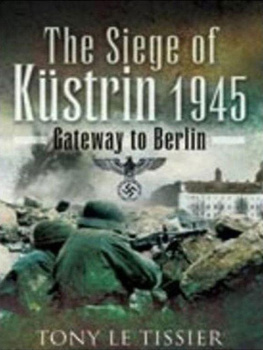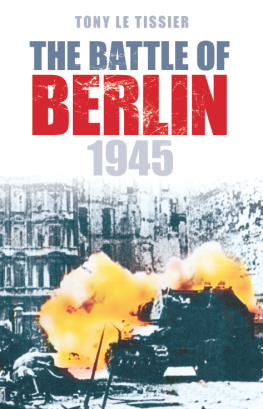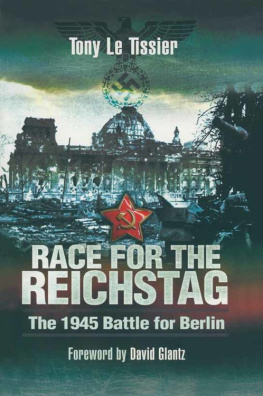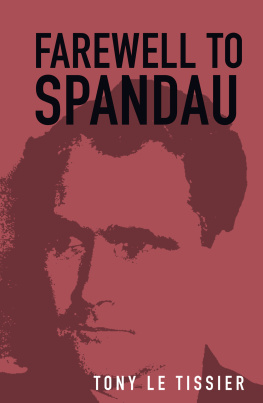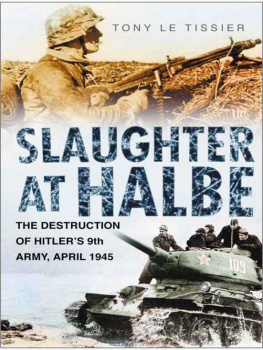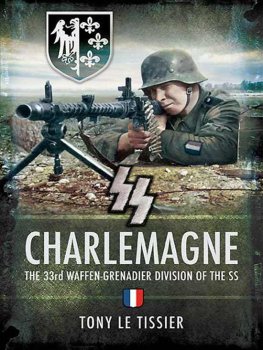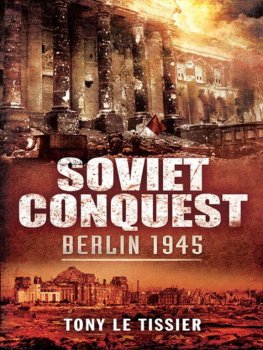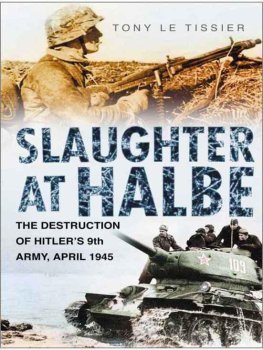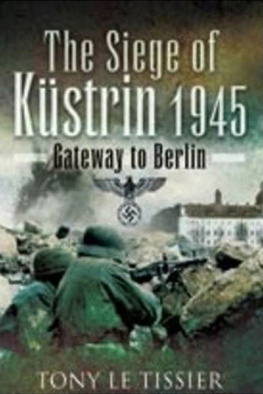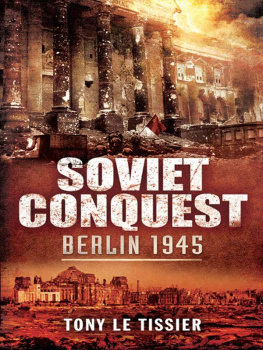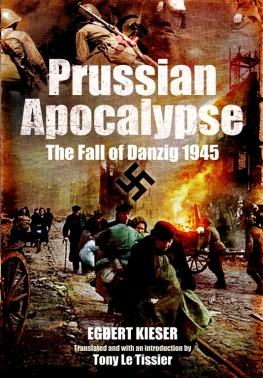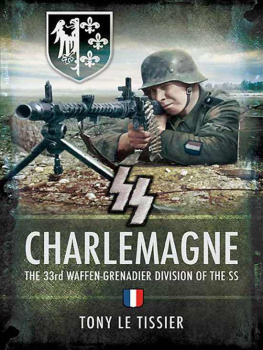Tony Le Tissier - With Our Backs to Berlin
Here you can read online Tony Le Tissier - With Our Backs to Berlin full text of the book (entire story) in english for free. Download pdf and epub, get meaning, cover and reviews about this ebook. year: 2001, publisher: Sutton Publishing, genre: Non-fiction. Description of the work, (preface) as well as reviews are available. Best literature library LitArk.com created for fans of good reading and offers a wide selection of genres:
Romance novel
Science fiction
Adventure
Detective
Science
History
Home and family
Prose
Art
Politics
Computer
Non-fiction
Religion
Business
Children
Humor
Choose a favorite category and find really read worthwhile books. Enjoy immersion in the world of imagination, feel the emotions of the characters or learn something new for yourself, make an fascinating discovery.

- Book:With Our Backs to Berlin
- Author:
- Publisher:Sutton Publishing
- Genre:
- Year:2001
- Rating:4 / 5
- Favourites:Add to favourites
- Your mark:
- 80
- 1
- 2
- 3
- 4
- 5
With Our Backs to Berlin: summary, description and annotation
We offer to read an annotation, description, summary or preface (depends on what the author of the book "With Our Backs to Berlin" wrote himself). If you haven't found the necessary information about the book — write in the comments, we will try to find it.
With Our Backs to Berlin — read online for free the complete book (whole text) full work
Below is the text of the book, divided by pages. System saving the place of the last page read, allows you to conveniently read the book "With Our Backs to Berlin" online for free, without having to search again every time where you left off. Put a bookmark, and you can go to the page where you finished reading at any time.
Font size:
Interval:
Bookmark:
THE GERMAN ARMY IN RETREAT 1945
TONY LE TISSIER
THE HISTORY PRESS
First published in 2001 by Sutton Publishing
This edition first published in 2005
Reprinted 2006, 2007
The History Press
The Mill, Brimscombe Port
Stroud, Gloucestershire, GL5 2QG
www.thehistorypress.co.uk
This ebook edition first published in 2013
All rights reserved
Tony Le Tissier, 2001, 2005, 2013
The right of Tony Le Tissier to be identified as the Author of this work has been asserted in accordance with the Copyrights, Designs and Patents Act 1988.
This ebook is copyright material and must not be copied, reproduced, transferred, distributed, leased, licensed or publicly performed or used in any way except as specifically permitted in writing by the publishers, as allowed under the terms and conditions under which it was purchased or as strictly permitted by applicable copyright law. Any unauthorised distribution or use of this text may be a direct infringement of the authors and publishers rights, and those responsible may be liable in law accordingly.
EPUB ISBN 978 0 7524 9469 2
Original typesetting by The History Press
List of Drawings
L eafing through the material I have accumulated from over twenty years of studying the Second World War Berlin battlefield scene, much of it feedback from the German editions of my books, The Battle of Berlin 1945 and Zhukov at the Oder, I came across so many interesting, hitherto unpublished pieces that I decided to bring some of them together here as a collection of short stories.
These heroic, often poignant accounts of the desperate, last-ditch defence of the Fatherland should not be taken in any way as an apology for the German cause. It is precisely because one so seldom hears their side of the story, that they deserve a wider readership. They are mainly told by former members of the Wehrmacht and even the dreaded Waffen-SS, some of them still surviving. Perhaps surprisingly, the stories are characterised by the same individual human warmth and soldiers humour as you might normally expect from the good guys the GIs, British and Commonwealth infantry and armoured brigades, who had to contend with a surprising degree of resistance before ending the war in Europe. The lesson, I suppose, is that we are all pretty much alike, under the uniform.
With Allied forces and, above all, the avenging Red Army of the Soviet Union closing in on all sides; with their communications, fuel supplies and heavy industries under constant air attack, it is noteworthy that the German armed forces managed to maintain such an effective resistance. One has only to recall General Eisenhowers decision not to attack Berlin after his forces had reached the line of the River Elbe, because of the anticipated 100,000 further casualties this might cost him. Field kitchens still operated. Dispatch riders still got through. Transfer orders were carried out. Drill parades were still held, even under the Russian shellfire. Eventually, as in W.B. Yeatss famous line, Things fall apart, the centre cannot hold... and the rout began. But the patriotic determination of the individual German soldier to defend his Fatherland with skill and discipline even at the cost of his life was never in question. Author Christabel Bielenberg summarised the situation neatly in The Road Ahead:
Germany had nothing to be proud of during Hitlers reign, but there were two outstanding exceptions. Firstly, the courage and tenacity of her soldiers when, inadequately equipped, they ultimately found themselves defending this country against the whole world. Secondly, the 20 July plot, when those who had taken part so nearly succeeded in ridding their country of a monster who had ruled over them for eleven years and who claimed their lives when they failed.
Only one of these stories covers the fighting on the Western front, where the US 94th Infantry Division had to breach the Siegfried Line in the severest of winter conditions, the infantry units suffering up to 500 per cent casualties. Despite bitter hand-to-hand combat, there was much mutual respect, as the stories about General Pattons handling of the surrender of 11th Panzer Division and the snatching of the famous Vienna Riding Academys Lippizaner horses from under the noses of the Russians are included to show. (It is interesting to note that in the part of Germany that lies between the Moselle and Saar rivers, the Americans are still regarded as the Liberators...)
In The Siege of Klessin, which I compiled mainly from the regiments surviving radio logs and the units after-action report, one gets a vivid impression of the combat: the extraordinary heroism of the frontline troops, trapped in their positions, unable to retreat and the basic futility of their military task, as Corporal Hitler played out his doomed role of the Greatest Field Commander of All Time....
In the late Horst Zobels account of the tank battle for the bridge at Golzow, a small armoured unit with a hopeless mission pits its exceptional fighting skills against Zhukovs seemingly limitless Soviet armoured forces. Erich Wittor describes an encounter with history and a Stuka ace at Kunnersdorf, and returns later with a longer account of the confused action at Marxdorf. Harry Schweizer recalls his experiences as a schoolboy anti-aircraft gunner posted to the Berlin Zoo flak-tower; and how, briefly, he got a taste of tank-busting with the SS. Gerhard Tillery gives us a riflemans account of the fighting in the Oderbruch, the retreat across Berlin and the eventual breakout of servicemen and civilians to the West. Karl-Hermann Tams describes the defence of Seelow, with a motley platoon of sailors and soldiers (who suffered over 90 per cent casualties) cowering under the greatest artillery bombardment in history. Rudi Averdieck, then a regimental radio sergeant, describes the harrowing retreat from Seelow to Berlin, and how he became involved with a newly-organised armoured brigade that had only one mission, to surrender to the Americans.
Quite properly, there are two Jokers in the pack. One is an account by Harry Zvi Glaser, a Latvian Jew who joined the Red Army and tells of his experiences at Halbe, where the remnants of the German 9th Army and its accompanying refugees suffered over 40,000 killed. (Harry, who became a US citizen, did not receive his medal until it was presented to him by President Yeltsin on a visit to the White House in 1995!) Finally, there is the insubordinate SS Sergeant Major Willy Rogmann, a born survivor (and the shortest man in his regiment) who, having done his bit for Fhrer and Fatherland in some of the toughest theatres of the war, found himself leading an unlikely team of combatants through the ruins of Berlin, armed with a British Sten-gun (they didnt jam, like the German Schmeissers).
These exciting true tales beg the ultimate question: what might we have done, With our Backs to London, or even Washington?
A H Le T
Frome, Somerset
January 2001
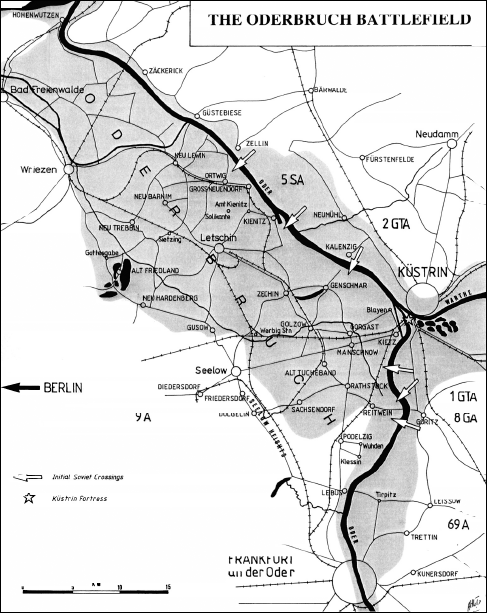
In 1945 Erich Wittor was a 20-year-old second lieutenant of three months standing, leading a squadron in the Armoured Reconnaissance Battalion Kurmark, commanded by Major Freiherr von Albedyll, only son of the squire of Klessin (see The Siege of Klessin). The Panzergrenadier Division Kurmark, to which his unit belonged, had yet to be fully formed on the basis of the Panzergrenadier Replacement Brigade of the famous Division Grossdeutschland. This brigade had been sent forward from Frankfurt under Colonel Willy Langkeit a few days earlier to try and help plug the gap caused by the collapse of the German 9th Army on the Vistula, and was now itself trapped immediately east of Kunersdorf. Marshal Zhukovs troops, here elements of the 1st Guards Tank and 69th Armies, were rushing forward to close up to the Oder River, hoping to secure bridgeheads on the west bank before the ice melted.
Font size:
Interval:
Bookmark:
Similar books «With Our Backs to Berlin»
Look at similar books to With Our Backs to Berlin. We have selected literature similar in name and meaning in the hope of providing readers with more options to find new, interesting, not yet read works.
Discussion, reviews of the book With Our Backs to Berlin and just readers' own opinions. Leave your comments, write what you think about the work, its meaning or the main characters. Specify what exactly you liked and what you didn't like, and why you think so.


